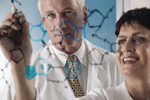 A health breakthrough in the field of cancer prevention is currently underway in Germany. It is specifically for lung cancer, the world’s most fatal tumor. The foundation is being laid for detecting lung cancer earlier, which would improve the outcome for millions of people. The best kind of health news is the kind about saving lives.
A health breakthrough in the field of cancer prevention is currently underway in Germany. It is specifically for lung cancer, the world’s most fatal tumor. The foundation is being laid for detecting lung cancer earlier, which would improve the outcome for millions of people. The best kind of health news is the kind about saving lives.
Scientists have found nearly 500 molecules whose concentration in the blood changes when a person develops lung cancer. These molecules — nucleic acids — either increase or decrease in numbers in the blood. And it is these that can be detected as a way to know if lung cancer is developing, according to a new study.
The best part is that these changes still happen if the tumor is in a very early stage. In lung cancer, there are four stages. In stages three and four, the outcome is likely not good and the best doctors can do is postpone eventual death. But stage-one lung cancer can be treated surgically and it can even be cured. The problem: only about 15% of these tumors are detected that early. The hope is that this simple blood test could raise the number of patients whose cancer is found early.
Such a test could be performed with results measured in the same day. The future of lung cancer treatment will depend in large part on early detection. And a screening test may be part of routine practice. The doctor takes a blood sample and, within a day, knows with a fair degree of certainty that lung cancer is present. And that is despite there being no symptoms yet.
The study investigated the blood of over 200 smokers. About half of them had lung cancer; the others were either entirely healthy or suffered from another lung disease. So they went to see if a test could differentiate lung cancer patients from healthy subjects. It is then that they found the nucleic acids and the patterns.
So, what’s happening now? There are plans for a much larger study to confirm the results. If true, there would be nothing standing in the way of developing the blood test to the point of being ready to be put on the market. And that is good news for everyone.
